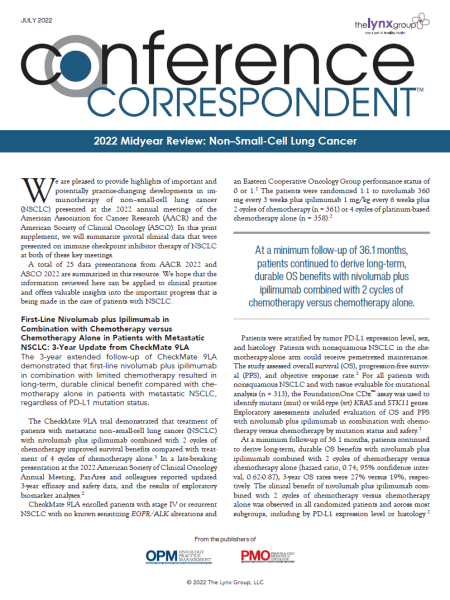Dual treatment with ramucirumab and erlotinib produced similar results in patients with ex21 and ex19 mutations.
Patients with metastatic non–small-cell lung cancer (NSCLC) and EGFR mutations have varied outcomes when treated with EGFR tyrosine kinase inhibitors (EGFR-TKIs). Patients with metastatic NSCLC and an exon 21 L858R (ex21) EGFR mutation have a lower reported benefit compared with patients with metastatic NSCLC and an exon 19 deletion (ex19) EGFR mutation when treated with an EGFR-TKI. The phase 3 RELAY trial reported that the combination of the anti–vascular endothelial growth factor receptor antibody ramucirumab and the EGFR-TKI erlotinib showed better progression-free survival (PFS) compared with placebo and erlotinib. The authors reported the efficacy and safety of the dual treatment of ramucirumab + erlotinib by EGFR mutation type during the ESMO Virtual Congress 2020.
Patients with metastatic NSCLC and an ex21 or ex19 mutation that had no central nervous system metastases were randomized 1:1 into 2 groups. The groups received 150 mg daily of erlotinib and either 10 mg/kg of ramucirumab or placebo every 2 weeks until patients met Response Evaluation Criteria in Solid Tumours 1.1–defined progression or experienced unacceptable toxicity. The results of the study were stratified by various measures that included EGFR mutation type and region (East Asia/other). The primary end point was PFS; secondary end points included overall response rate (ORR), disease control rate (DCR), duration of response, safety, time to second progression, and biomarker analyses. Cox regression and Kaplan-Meier estimation were used to analyze data, and adverse events (AEs) were evaluated on the National Cancer Institute-Common Terminology Criteria for Adverse Events Version 4.0 scale.
Most patients were of Asian descent, including 83% of patients with EGFR ex21 and 72% with EGFR ex19 mutations. Patients with both types of mutations had similar rates of dose adjustments, grade ≥3 AEs, and serious AEs. PFS, ORR, and DCR were improved in both mutant types by ramucirumab + erlotinib compared with erlotinib alone (Table). Median follow-up time was 20.7 months (range, 0.1-35.4 months).
Patients with both ex21 and ex19 mutations had similar benefits when treated with ramucirumab + erlotinib, and this was consistent with the intention-to-treat analysis. The authors concluded that ramucirumab + erlotinib dual treatment can be a first-line therapy for patients with metastatic NSCLC ex19 or ex 21 EGFR mutations.
| Ex19 | Ex21 | |||
|---|---|---|---|---|
| RAM+ERL (N = 123) |
PBO+ERL (N = 120) |
RAM+ERL (N = 99) |
PBO+ERL (N = 105) |
|
| PFS | ||||
| Median, months | 19.6 | 12.5 | 19.4 | 11.2 |
| HRa (95% CI)a; log-rank P valuea | 0.651 (0.469-0.903); P = .01 | 0.618 (0.437-0.874); P = .006 | ||
| 1-year PFS rate, % | 74 | 54 | 70 | 47 |
| ORR, % | 79 | 83 | 74 | 66 |
| DCR, % | 96 | 96 | 95 | 95 |
| DOR, no. responders | 97 | 99 | 73 | 69 |
| Median, months | 18.2 | 11.0 | 16.2 | 11.1 |
| HR (95% CI)a | 0.542 (0.380-0.772) | 0.731 (0.493-1.083) | ||
CI indicates confidence interval; DCR, disease control rate; DOR, duration of response; ERL, erlotinib; ex19, exon 19 deletion EGFR mutation; ex21, exon 21 L858R EGFR mutation; HR, hazard ratio; PBO, placebo; PFS, progression-free survival; ORR, objective response rate; RAM, ramucirumab.
Reference
Nakagawa K, et al. ESMO 2020. Abstract 1294P.

